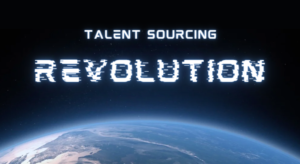
With the recent launch of ChatGPT and other AI software tools we are just beginning to scratch the surface of our understanding of how AI can revolutionize the recruiting and talent sourcing industries. The use of AI technology in recruiting is set to experience significant growth in the coming years, and below are some potential ways in which AI could impact recruiting in the future.
The use of machine learning algorithms is transforming recruitment, allowing HR professionals to quickly identify qualified candidates by analyzing resumes and job descriptions. Applicant tracking systems use these algorithms to analyze resume patterns and identify candidates’ suitability for specific positions.
AI software can streamline, expedite, and cost-effectively reduce the hiring process while ensuring impartiality. Here are some ways in which HR professionals utilize these tools for effective talent management!
1. Candidate matching
AI-powered tools can be trained to recognize key words and phrases in job descriptions and resumes to match candidates with jobs based on their experience in a particular industry or technology sector. This improves the effectiveness and efficiency of hiring, enabling businesses to quickly analyze large data sets to identify the talent they need.
2. Predictive assessments
Predictive analytics can also be implemented to evaluate a candidate’s credentials and abilities to forecast their likelihood of success in a particular role. This helps to find the best fit for a job, even among applicants who lack the required credentials but have the potential to excel. Predictive analytics also helps to lower bias in the hiring process by providing a more impartial evaluation of candidates.
3. Referral automation
To connect candidates with relevant opportunities, AI-powered matching tools can be used to match a candidate’s qualifications and skills with the job description of an open position. This minimizes irrelevant applications and saves time and energy on candidate screening.
4. Chatbot assistants
Virtual assistants can be used to automate tasks that don’t require human input, such as setting up interviews, sending follow-up emails, and responding to standard inquiries from candidates. This saves time and improves efficiency, allowing hiring teams to focus on more complex procedures while enhancing the candidate experience. Additionally, virtual assistants can collect feedback from withdrawn applicants to identify potential areas for organizational improvement.
5. Automated screening with chatgpt
As an AI language model, ChatGPT can certainly be used to screen and interview candidates. However, there are several challenges and considerations that need to be addressed before ChatGPT can effectively take on this role.
First, ChatGPT would need to be trained on specific job requirements, industry knowledge, and relevant skills to ensure it understands the position and can ask appropriate questions. This training could be done by providing ChatGPT with large datasets of job descriptions, resumes, and interview questions and answers.
Second, ChatGPT would need to be designed to effectively communicate with candidates. This would require natural language processing (NLP) and machine learning techniques to enable ChatGPT to understand and interpret candidate responses accurately.
Third, ethical considerations such as ensuring fairness, eliminating bias, and protecting privacy and confidentiality would need to be addressed to ensure ChatGPT’s screening and interviewing processes are equitable and objective.
Final thoughts: It’s time to embrace change
Recruiters should not be afraid of AI but instead embrace it in their daily activities for several reasons:
Time-saving: AI-powered tools can automate repetitive and time-consuming tasks, such as screening resumes and scheduling interviews. This frees up recruiters’ time to focus on higher-value activities, such as engaging with candidates and building relationships with hiring managers.
Impartiality: AI can help to eliminate unconscious bias in the recruitment process by removing human error and subjectivity. This can result in a fair and more objective hiring process.
Cost-effective: Implementing AI-powered tools can reduce recruitment costs by automating tasks that would otherwise require manual labor. This can result in significant cost savings for organizations.
Enhanced efficiency: AI-powered tools can quickly analyze large data sets to identify the best candidates for a particular role. This can reduce the time-to-hire and improve the efficiency of the recruitment process.
Improved candidate experience: AI-powered tools can provide candidates with a more personalized experience by matching them with roles that fit their qualifications and preferences. This can lead to a more positive candidate experience and a higher likelihood of accepting a job offer.
Overall, AI can bring many benefits to the recruitment process, and recruiters should embrace these tools to improve their daily activities and enhance their ability to find the best talent for their organizations.
Recommend Reading:
How to build an effective interviewing team
How spamming has negatively impacted recruiters
Sourcing neurodivergent professionals: building an inclusive recruiting process
- Unlocking the Power of Perplexity AI: Why Recruiters Should Utilize This Revolutionary Tool - February 11, 2024
- Exploring AI Interviewing Assessment Tools: A Comprehensive Review - November 30, 2023
- PartyRock a Sandbox for Talent Sourcing - November 29, 2023
